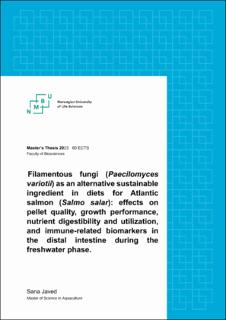| dc.description.abstract | Filamentous fungi (FF) are promising microbial ingredients (MI) for use in aquaculture feeds due to their high protein content and bioactive components with potential health beneficial effects. This study aimed to assess the effects of Paecilomyces variotii produced from sulfite stillage obtained from forest by-products on pellet quality, growth performance, nutrient digestibility and utilization, and expression of immune-related biomarkers in the distal intestine of Atlantic salmon (Salmo salar) reared in freshwater. Four isonitrogenous, isolipidic, and isoenergetic diets were formulated. Diet 1 was a control diet formulated with fish meal, soy protein concentrate, and wheat gluten meal. Diets 2, 3, and 4 were formulated so that P. variotii replaced 5%, 10%, and 20% of the crude protein content of the diets, respectively. As the inclusion level of P. variotii increased, there were changes in physical pellet quality, with linear and/or quadratic decreases in pellet length, width, expansion, and durability, and linear and quadratic increases in water activity, bulk density, sinking velocity, and water stability index. The changes in pellet quality were attributed to the high fiber and β-glucan content of P. variotii. Although weight gain, growth rate, and feed intake were not significantly different among fish fed the experimental diets, there was a linear improvement in feed conversion ratio with increasing inclusion level of P. variotii. The apparent digestibility coefficients for crude protein and gross energy decreased linearly with increasing dietary levels of P. variotii, as did those for essential and non-essential amino acids. However, there was a linear increase in nitrogen, energy, and mineral retention efficiencies with an increasing inclusion level of P. variotii. Furthermore, it was found that P. variotii exhibits immunomodulatory effects in the distal intestine. Based on these results, it can be concluded that P. variotii has high potential as an alternative protein ingredient in salmon feeds. | |
